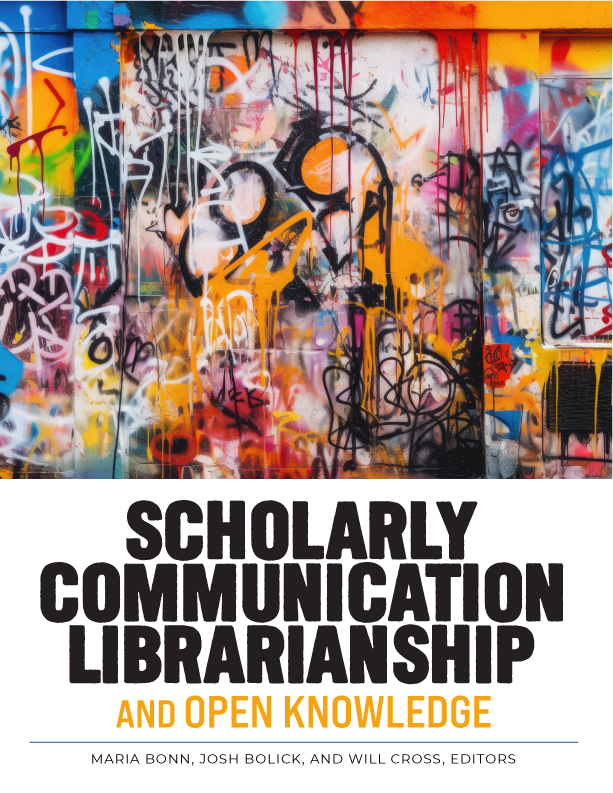Folks, this is a big moment! We’ve been working towards an open textbook about scholarly communication librarianship for a long time. It was the core of our initial collaboration, which goes all the way back to 2016. A lot has happened (ahem) in the interim. Last fall we submitted the complete manuscript of Scholarly Communication Librarianship and Open Knowledge to ACRL. In May, we got the copyedited manuscript back and spent most of the summer working through changes. Recently, we reviewed two rounds of proofs, shared cover ideas with our designer and gave design feedback. Last week the formatted book went to the printer! Yesterday, we were in the September issue of The Syllabus from ACRL newsletter, and on Monday, we shared the beautiful cover, which we’re thrilled with.

It sounds like ACRL is excited about it, too! Here’s their description:
The intersection of scholarly communication librarianship and open education offers a unique opportunity to expand knowledge of scholarly communication topics in both education and practice. Open resources can address the gap in teaching timely and critical scholarly communication topics—copyright in teaching and research environments, academic publishing, emerging modes of scholarship, impact measurement—while increasing access to resources and equitable participation in education and scholarly communication.
Scholarly Communication Librarianship and Open Knowledge is an open textbook and practitioner’s guide that collects theory, practice, and case studies from nearly 80 experts in scholarly communication and open education. Divided into three parts:
- What is Scholarly Communication?
- Scholarly Communication and Open Culture
- Voices from the Field: Perspectives, Intersections, and Case Studies
The book delves into the economic, social, policy, and legal aspects of scholarly communication as well as open access, open data, open education, and open science and infrastructure. Practitioners provide insight into the relationship between university presses and academic libraries, defining collection development as operational scholarly communication, and promotion and tenure and the challenge for open access.
Scholarly Communication Librarianship and Open Knowledge is a thorough guide meant to increase instruction on scholarly communication and open education issues and practices so library workers can continue to meet the changing needs of students and faculty. It is also a political statement about the future to which we aspire and a challenge to the industrial, commercial, capitalistic tendencies encroaching on higher education. Students, readers, educators, and adaptors of this resource can find and embrace these themes throughout the text and embody them in their work.
Look at the absolutely phenomenal list of folks involved in the finalized TOC! We’re expecting publication in print to coincide with Open Access Week in late October, with an OA version available to download a bit earlier on the ALA Store. There are almost 80 contributors to the book, with a broader community of support, and a non-profit publisher supporting open publication. How’s that for community over commercialization?
There are already a couple of LIS scholcomm courses using a preprint version of the book this fall, and those instructors have been really positive about the book and related materials in the Scholarly Communication Notebook (SCN). We’re in touch with a few more folks who are looking forward to using it, too. We’re planning to develop an instructor’s companion to support use in LIS classrooms. If you’re teaching a course or workshop that could use all or part of the book, get in touch! We’d love to know more, and to talk about how we can support each other.
It’s been such a privilege to be a part of the development of this work and members of this community! We’re excited to finally see it coming out! We have so much gratitude to our peers who edited sections, all the authors, ACRL folks, especially our editor Erin Nevius, all the folks that helped to shape our thinking along the way, and many others. Onward and upward!
Maria, Josh, and Will
